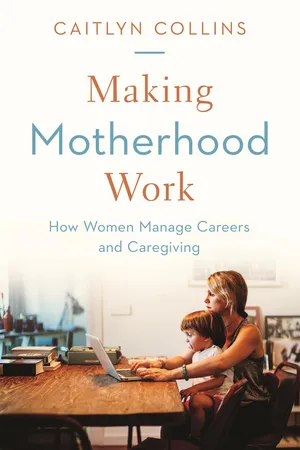
- English
- PDF
- Available on iOS & Android
About this book
A moving, cross-national account of working mothers' daily lives—and the revolution in public policy and culture needed to improve them
The work-family conflict that mothers experience today is a national crisis. Women struggle to balance breadwinning with the bulk of parenting, and stress is constant. Social policies don't help. Of all Western industrialized countries, the United States ranks dead last for supportive work-family policies: No federal paid parental leave. The highest gender wage gap. No minimum standard for vacation and sick days. The highest maternal and child poverty rates. Can American women look to European policies for solutions? Making Motherhood Work draws on interviews that sociologist Caitlyn Collins conducted over five years with 135 middle-class working mothers in Sweden, Germany, Italy, and the United States. She explores how women navigate work and family given the different policy supports available in each country.
Taking readers into women's homes, neighborhoods, and workplaces, Collins shows that mothers' desires and expectations depend heavily on context. In Sweden—renowned for its gender-equal policies—mothers assume they will receive support from their partners, employers, and the government. In the former East Germany, with its history of mandated employment, mothers don't feel conflicted about working, but some curtail their work hours and ambitions. Mothers in western Germany and Italy, where maternalist values are strong, are stigmatized for pursuing careers. Meanwhile, American working mothers stand apart for their guilt and worry. Policies alone, Collins discovers, cannot solve women's struggles. Easing them will require a deeper understanding of cultural beliefs about gender equality, employment, and motherhood. With women held to unrealistic standards in all four countries, the best solutions demand that we redefine motherhood, work, and family.
Making Motherhood Work vividly demonstrates that women need not accept their work-family conflict as inevitable.
Frequently asked questions
- Essential is ideal for learners and professionals who enjoy exploring a wide range of subjects. Access the Essential Library with 800,000+ trusted titles and best-sellers across business, personal growth, and the humanities. Includes unlimited reading time and Standard Read Aloud voice.
- Complete: Perfect for advanced learners and researchers needing full, unrestricted access. Unlock 1.4M+ books across hundreds of subjects, including academic and specialized titles. The Complete Plan also includes advanced features like Premium Read Aloud and Research Assistant.
Please note we cannot support devices running on iOS 13 and Android 7 or earlier. Learn more about using the app.
Information

Table of contents
- Cover Page
- Title Page
- Copyright Page
- Dedication Page
- Contents
- Preface
- Acknowledgments
- 1. SOS
- 2. Sweden: “It is easy in Sweden to work and have kids.”
- 3. Former East Germany: “I wouldn’t know how to handle forty hours.… That’s no life.”
- 4. Western Germany: “ ‘You are a career whore,’ they say in Germany.”
- 5. Italy: “Nobody helps me. It is very difficult in Italy.”
- 6. The United States: “We can’t figure out how to do it all at the same time.”
- 7. Politicizing Mothers’ Work-Family Conflict
- Appendixes
- Notes
- References
- Index
- Discussion Questions